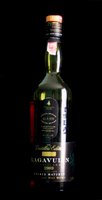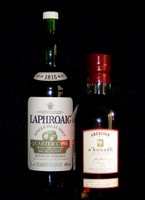Doctor Dritan tells me that most of the whisky on sale in Tirana is produced locally and packaged in counterfeit bottles and cartons. This is disappointing news. I was surprised to find whisky – including some good malt whisky – for sale in many stores across the city. At first glance it looked real enough, but I think I am going to have to look more closely now.

Thankfully, I had worked on the assumption that good whisky would not be available here and brought my own supplies. On the way here I picked up a Lagavulin Double Matured in London and a Highland Park 12 year old in Milan.

In Prague I visited Kratochvílovci, a great little whisky shop, and brought back a Laphroaig Quarter Cask and an Abelour a’bunadh. Vienna airport duty free also had the outstanding Glenfiddich Gran Reserva – a 21 year old Glenfiddich finished in Cuban rum casks. I exercised some iron discipline and did not buy it. Next time though. I gave Doctor Dritan some of the Lagavulin when he visited recently and he was suitably impressed.
People in this country – including the doctors - have an interesting attitude to alcohol. When I joined Doctor Dritan and some of his medical friends to play football recently, we arrived early and went to his house where he poured us both a very generous measure of whisky (Grant’s for me; Jack Daniel’s for him). This did not seem an ideal preparation for running around for an hour but it seemed impolite to refuse. (The very large helping of home made baklava – delicious – probably didn’t help either.)
When we arrived at the pitch we then discovered that as a result of a mix up over bookings we were going to have to wait an hour. From somewhere, one of the doctors produced a 2 litre Coke bottle full of Raki. Raki is the Albanian version of the grape (or plum) based spirit common in these parts. Not being entirely sure of the provenance, or the potency, of the doctor's supply I managed to politely decline for fear of falling over on the pitch.
I read a Wikipedia article claiming that ‘raki is an aperitif and is usually drunk in very small amounts.’ Maybe I'm not mixing with the right people, but I can’t say I’ve noticed this. Doctor Dritan – the other Doctor Dritan, that is – drinks Raki as an aperitif, a digestif, and as an accompaniment to the meal. It is, he assures me, great medicine. With his encouragement I have tried it a couple of times, though I have to confess that I have not yet developed a taste for it.
The Doctor Dritans appear to be representative of the Albanian medical profession on this question. An American expat who joined a local gym met with a cardiologist in accordance with the gym’s very sensible policy of making sure people are not going to drop dead on them. The cardiologist’s only advice was that my American friend was not drinking enough – he needed at least 21 units of alcohol a week.
Despite this fairly relaxed attitude to alcohol I have yet to see any of the kind of public drunkenness that disfigures the streets of Britain, or Ireland or America. Albanians seem to avoid binge drinking by spreading their considerable alcohol consumption through the day.
Unfortunately, this relaxed attitude also means that there are a frightening number of people driving cars under some degree of influence. It’s also reasonable to assume that Albanians are not immune to the many consequences of high levels of alcohol consumption – ill-health, domestic violence, low productivity and much else besides.
Somewhere between hysterical over-reaction and relaxed indifference there is a happy medium on this issue. I don’t know where it is but I might try to figure it out tonight over a glass of whisky.
Comments
A couple of points that might help you:
Don't take any generalizations for granted. "Doctor Dritan tells me that most of the whisky on sale in Tirana is produced locally and packaged in counterfeit bottles and cartons." I might not be a connoisseur like yourself, but I can guarantee you that the Johnny Walker blends I consumed there were not fake. I know my Johnny! So inquire and decide for yourself. Also the Bombay Safire that I bought in Tirana's shops was as fine as anywhere else in the world. Albanians tend to be very cynical of any commercial product with foreign labels.
The alcohol consumption model that you have established is not that accurate. I think that the surveyed pool does not represent the Albanians as a people. We are mostly social drinkers, as you have noted. Of course there are side effects to the alcohol consumption. However, this is not a national flaw to be concerned with. You should be more concerned that most drivers are relatively new drivers, because we weren’t allowed to have cars during communism. Watch out from new female drivers. There is my mother driving in Tirana, and she learned how to drive at 54 years old, God help us. I wouldn’t want to run into her, that’s for sure.
I will have a drink to this post though! Cheers!
I still think Albanians tend to drink a lot - whether socially or not - but then I have just spent a year living in Washington where having a third beer classes you as a heavy drinker.
I'll be sure to keep an eye out for your mum when I'm crossing the roads.
Another thing to consider is that, in my opinion, Americans drink more than Albanians. At least in Boston and Cali. There is not much culture behind it either. My buddies and I only get hammered on special occasions and have a drink or two on not so special days. Most young Americans I've known binge drink worse than in England on a regular weekday, specially teenagers. In my 18 years in Albania I don't remember that ever happening. But who knows, perhaps times have changed now. And perhaps I need to hang out with a classier crowd here.
As for the quality of foreign brands, you just have to know where to shop. If it's really cheap for what the label says, chances are it's a fake. Raki can also vary a lot. The good stuff shouldn't smell like pure alcohol, and it shouldn't give you a headache afterwards.
Give Skanderbeg Brandy a try: http://www.albaniabiz.org/pdfs/kantina.pdf
Young Bimbashi, good to hear from you. I had a look at your site and was particularly interested in your diary from your 2003 visit. The experience you describe of feeling that so many people here do not have the energy or the determination to pursue their goals sounds familiar. A number of people I have spoken to here who have lived or studied abroad have said the same thing to me. In Northern Ireland, where I come from, we had something of the same problem. People who left to study or work always found it hard to adjust when they came back. Many did not come back, or did not stay. Glad you liked Stockholm as well - it's one of my favourite places. There is a great whisky bar in Gamla Stan called Ardbeg, and the Cafe Duvel on Vasagaten ywrbbserves fine Belgian beer.
Anonymous, I have heard a lot about the Skanderbeg brandy but haven't had a chance to try it yet. It is on my list though.
This phrase just made it to the top of my bar-small-talk list. Joy, you are a genius.
What I have found hard to get used to is people who drive like this and have kids in the car with them, sometimes with their noses pressed against the windscreen. IF they want to kill themselves that's one thing, but risking you kids is just crazy.
I too have noticed the relaxed attitude that otherwise seems to prevail. I've never seen anything here that I would call road rage - something I saw all the time in the US and in Northern Ireland.